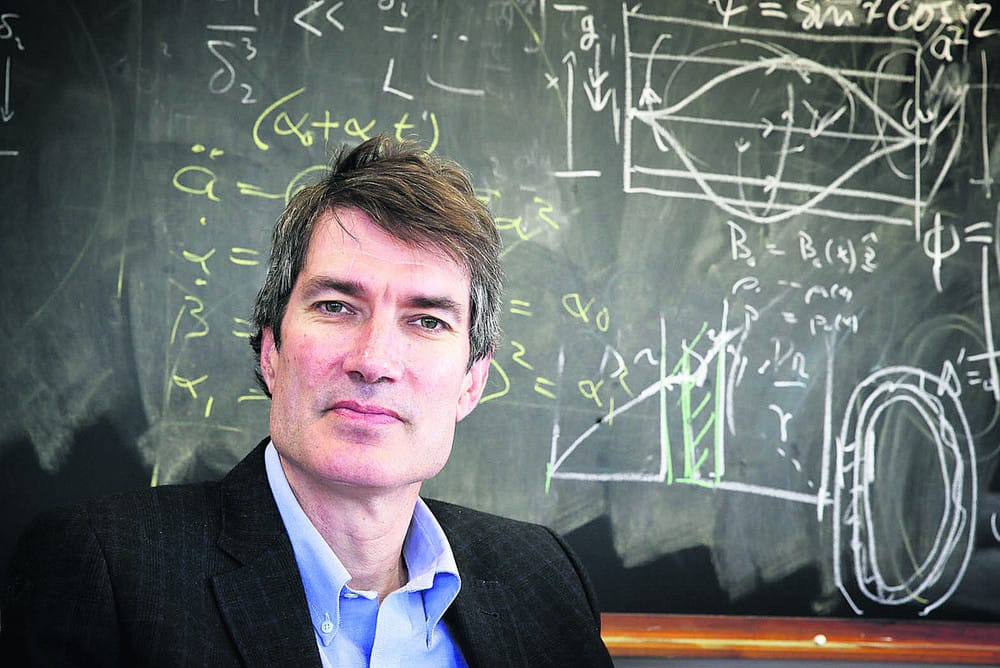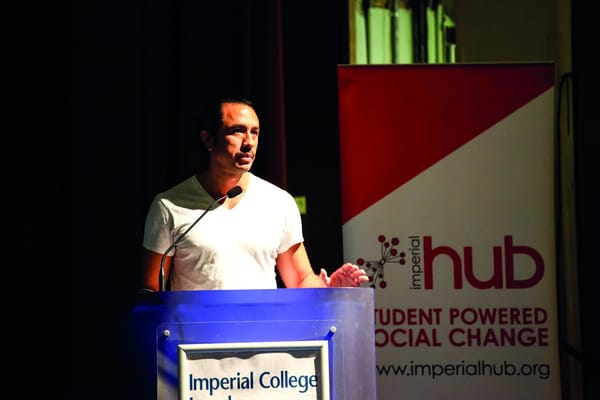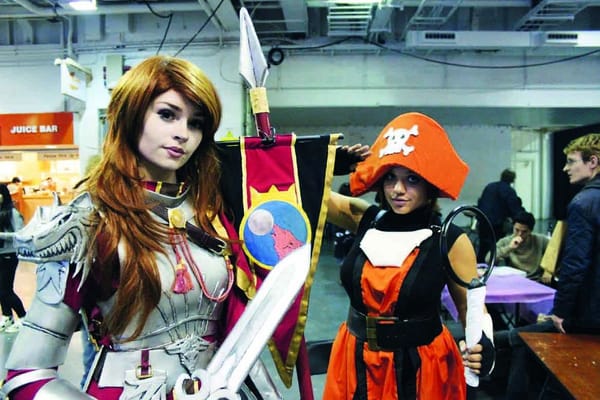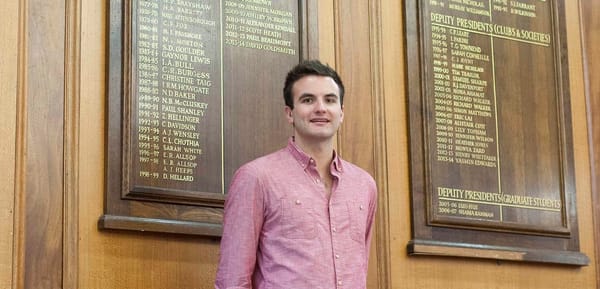Getting close to Cowley
Xuan Chen interviews one of the country’s most influential man about science, energy and how he maintains his hair

Professor Steven Cowley is the CEO of the United Kingdom Atomic Energy Authority and a part-time professor in plasma physics here at Imperial College. But that’s not what catches the attention of an entire cohort of physics undergraduates every year – it’s his lectures, where his charisma and confidence along with sheer passion for the subject captivates the young audience.
The fact that someone so important still has to make trips into Lecture Theatre One to teach undergraduate material to a bunch of unruly students is baffling to some.
Steve is preparing a presentation on a small laptop when I arrive at his office to interview him. The space, which he shares with three other academics, is modest, featuring a few desks and chairs along with a worn-out sofa in the corner and a slightly grubby plasma ball on the windowsill.
Xuan Chen: So, tell us what you do, in a (toroidal) nutshell?
Steven Cowley: I’m the CEO of the United Kingdom Energy Authority, and the Head of Association with EURATOM – the European Atomic Energy Community. This means that I lead research into fusion, and even though I’m a theoretical physicist, I run experiments, too. I still have some time to sit down and solve problems as a theoretical physicist. That’s what I really enjoy, but that time gets shorter and shorter every day.
XC: You have three fellowships (Royal Society, Royal Academy of Engineering, and Institute of Physics), and a Glazebrook medal for leadership in physics. Have I missed anything out?
SC: No. Awards are very important, and it’s lovely to receive them. I’m chuffed to receive awards, but more than anything else I want to see fusion happen in my lifetime. It is that important that we solve this problem.
"There is nothing I like better than to sit with a problem in front of me which isn’t solved."
At the end of the day there is nothing I like better than to sit with a problem in front of me which isn’t solved. And I have less and less time to do that. You don’t choose a career in physics to become a celebrity. I do what I do because I want to see fusion solved in my lifetime, and fusion has immense challenges ahead of it.
One of the scientists I’ve been reading up on lately is Enrico Fermi, someone very influential in the first nuclear experiments. My thesis advisor had lectures from Fermi. Fermi was a godlike figure, but a very humble man, who liked nothing better than to solve equations, and to work with students.
That’s the fun thing about physics – not being looked up to, because he’s working with people. I’m working with some young people, who get there faster than I do now, and that’s just great fun to be with. I enjoy physics for the social aspect: working together with other scientists to solve things together.
XC: Exactly how important is fusion to our future?
SC: Think of it this way: we have a world which is very unequal, at the moment. Some people live very well, and consume lots of energy. And, some people don’t live very well, and consume very little energy.
If we want to solve this inequality, and bring billions of people up to the standard of living we enjoy, they are going to have to consume more energy – about a factor of two or three in the next forty years.
How we’re going to supply that energy without completely messing up the atmosphere, I don’t know, except if we can crack these hard scientific puzzles. In the long term, we have to think about solar, advanced fission reactions in breeder reactor, and fusion, the only ones which have enough capacity to sustain us.
Fusion is a very attractive energy source; it’s clean, and sustainable (at least for the next 30 million years), but is very hard to actually do. As a scientist, that’s what’s also makes it so attractive; if it were easy, it wouldn’t be as much fun!
"I was a lazy, good-for-nothing student who didn’t work very much."
There are, throughout history, human quests where we try to conquer something, like flying. For hundreds of years people tried to fly and when the breakthrough happened, the whole world suddenly changed forever.
I think fusion is like that and for me, that was one of the great attractions; to be really involved with something that is really difficult that would really change the world. I saw that it would be helpful; I saw that it would be something that really has to be pursued, but also something I just thought that it would be fun. And it has been fun!
XC: How did you get into fusion? Did you choose fusion or did fusion choose you?
SC: I decided to go into fusion when I was in my final year of undergraduate studies. It was 1980 which was around the time of the first ‘oil shocks’. Oil prices rose nearly 400% in a few months, and it was becoming clear that we don’t have unlimited sources of fossil fuels, and we can’t burn all of them anyway.
At that time, a lot of research was going into the tokomak and it was becoming clearer that fusion was something that is possible; it could be done! So I went to Princeton to do my PhD, as it was really carrying out the forefront of physics research at that time. After that, I carried out postdoctoral research back here at JET (Joint European Torus, Oxfordshire), then went back to the States for fifteen years. I came back to Imperial at around 2000.
XC: What is your background? Were there any figures in your life who inspired you?
SC: I grew up in Cambridgeshire and did my undergraduate degree at Oxford. At that time, I was a lazy, good-for-nothing student who didn’t work very much. When I went to Princeton to do my PhD, however, I was suddenly surrounded by incredibly intelligent, hard-working people- at that time, everyone there was working on string theory.
We used to get up at eight, work on physics and solve problems until eleven at night, and then go to the bar. At 12:30 we would set our alarms and get back up at eight the next day to keep going. That’s where I learnt to be a physicist. About 10% talent, and 90% hard work and dedication. If you’re an undergraduate at Imperial, you have the talent already.
My father was a scientist; he taught engineering at Cambridge, so I grew up in a family in which engineering was very, very important. So even though I’m a theoretical physicist, I enjoy the practical side of physics.
Another very influential figure was Shaun Wiley, one of the mathematicians who cracked the Enigma code, who was also my maths teacher in high school. I think he had a big influence on me when I was seventeen or eighteen.
He taught me to appreciate the satisfaction of solving puzzles, and the privilege of being paid to do something you love.
XC: You also sit on the Prime Minister’s Council for Science and Technology. How influential are scientists in policy making?
SC: It is very interesting to see how politicians interact with scientists. The Prime Minister is a very serious man. He takes notes at every meeting, and is interested in getting the best out of British science. Everybody recognises and is proud of our science and technology base. They definitely hold scientists in very high regard.
"It is very interesting to see how politicians interact with scientists."
XC: Despite all this, you still have to teach the undergraduate course in Electromagnetism, as required by a professor. How important is teaching to you?
SC: I like teaching, because even though what I teach is not at the very frontier of what we know, it puts me in contact with students. Famously, Richard Feynman turned down a position at the Institute of Advanced Study at Princeton because it had no teaching. He proclaimed that teaching is what keeps you in contact with young people and young people are the ones who are going to solve the next problems. As you get older as a scientist, you realise that you’re not going to crack certain problems, but it would be really nice to see a young person crack this problem. When you’re
"Don’t kid yourself you understand something if you don’t.”
teaching, you’re meeting people like yourself from the next generation. Some people, in my class, I’d like to think are the ones producing the next breakthroughs. I probably don’t get as much time as I’d like for interacting with students.
XC: Gentleman’s Quarterly (GQ) ranks you in the top 100 influential men in the country, ahead of Alexander Lebedev, Richard Branson, Danny Alexander, and Brian Cox. I also understand that you have two sons – as an influential man, how do you hope to influence them in their futures?
SC: I think your children have to find their own way – it’s a dangerous thing to expect them to live up to their parents. They should decide what they should do with their own lives. You want your children to enjoy the things that you enjoy, but actually they will enjoy the things they enjoy. And that may not be physics, nor science – it could be anything. I think my sons are going to do different things than me. Being a good parent is about valuing what your children value.
XC: Okay – I have some general questions now, from other students who are also interested in you and your work. First of all – how do you keep your hair so luscious?
SC: (laughs) I don’t think it’s luscious. It’s going grey, like everyone else’s. But if I had to say, it’s probably due to my consumption of sweets.
XC: Are there noticeable differences in attitude towards scientists in the UK and the US?
SC: A bit. The American attitude believing that science can change the future in a big way is a lot stronger in the States than in Europe. Here people worry that things may lead to more pollution or troubles. I like the American can-do attitude, and the pioneer spirit. But to be honest, I’m an Englishman – I feel more at home in London.
XC: How much coffee do you drink?
SC: Too much. I drink until my head hurts.
XC: What advice would you give to young scientists?
SC: The most important thing – don’t kid yourself you understand something if you don’t.
XC: Some of your second year fans made this picture of you (inset). Do you have anything to say?
SC: No comment. There are embarrassing pictures of me out there and that particular photo took ages. The photographer was very fussy and forced me to pose next to the electrical plant!








